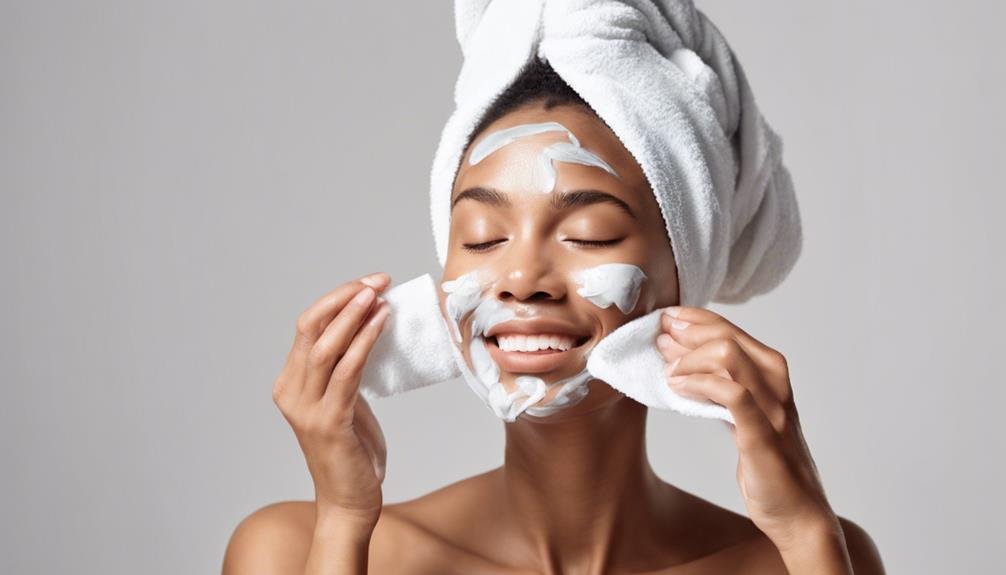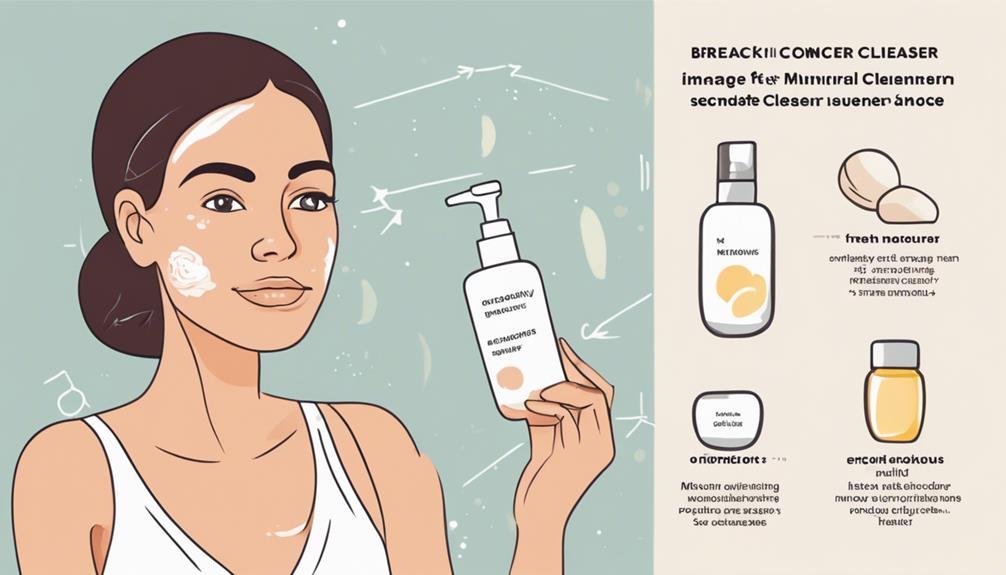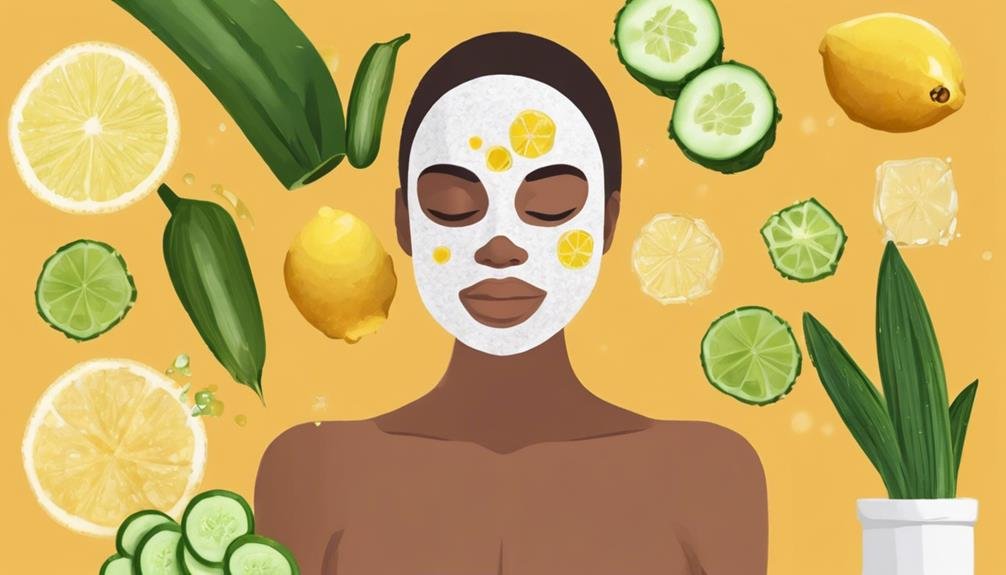When it comes to maintaining clear and healthy skin, have you ever considered that natural solutions might be the key to avoiding breakouts? By making a few simple adjustments to your skincare routine and lifestyle choices, you can significantly reduce the occurrence of unwanted blemishes. Starting with understanding your skin type and the importance of hydration, there are various strategies that can help you achieve a radiant complexion without relying on harsh chemicals or treatments. So, are you ready to unlock the secrets to naturally clear skin?
Key Takeaways
- Use non-comedogenic skincare products to prevent clogged pores and breakouts.
- Maintain a balanced diet with nutrient-rich foods and hydration for clear skin.
- Practice gentle exfoliation techniques to remove dead skin cells and unclog pores.
- Manage stress through mindfulness, exercise, and self-care to reduce breakouts.
- Get enough quality sleep to support skin repair and prevent hormonal imbalances leading to breakouts.
Understanding Your Skin Type
Understanding your skin type is crucial when it comes to managing breakouts naturally. By identifying whether you have oily, dry, combination, or sensitive skin, you can tailor your skincare routine to effectively prevent and treat breakouts.
Oily skin tends to produce excess sebum, leading to clogged pores and acne, while dry skin may experience breakouts due to lack of moisture causing irritation. Combination skin requires balancing different areas that may be oily and dry, needing targeted products for each zone.
Sensitive skin is prone to inflammation and reactions, making it vital to use gentle, non-irritating products to avoid triggering breakouts. Knowing your skin type allows you to choose the right cleansers, moisturizers, and treatments that won't exacerbate breakouts but instead promote a clear and healthy complexion.
Take the time to understand your skin's unique needs and concerns to effectively manage breakouts and achieve radiant skin naturally.
Importance of Hydration
To maintain healthy and clear skin, the importance of hydration can't be overstated. Hydration plays a crucial role in keeping your skin looking radiant and blemish-free. When your body is well-hydrated, your skin is better equipped to flush out toxins and maintain its elasticity. Dehydration can lead to a dull complexion, clogged pores, and an increase in breakouts.
Drinking an adequate amount of water daily is essential for overall skin health. Aim to drink at least 8-10 glasses of water each day to help your skin stay hydrated from the inside out. Additionally, incorporating hydrating foods into your diet, such as fruits and vegetables with high water content, can further support your skin's hydration levels.
Incorporating a hydrating skincare routine is also key to maintaining clear skin. Using a moisturizer that suits your skin type can help lock in moisture and prevent dryness. Look for products with ingredients like hyaluronic acid or glycerin for added hydration.
Gentle Cleansing Techniques
Maintaining clear and healthy skin starts with gentle cleansing techniques. When it comes to taking care of your skin, a gentle approach can make all the difference. Here are some tips to help you cleanse your skin effectively:
- Use a mild cleanser: Opt for a gentle cleanser that's free of harsh chemicals and fragrances to avoid irritating your skin.
- Avoid over-cleansing: Washing your face too frequently can strip the skin of its natural oils, leading to dryness and potential breakouts.
- Pat dry, don't rub: After cleansing, gently pat your skin with a soft towel instead of rubbing vigorously to prevent unnecessary irritation.
Balancing Your Diet
Achieving clear and radiant skin isn't just about what you put on your face; it also heavily depends on what you put into your body. Balancing your diet plays a crucial role in maintaining healthy skin and preventing breakouts. Incorporating a variety of nutrient-rich foods such as fruits, vegetables, whole grains, and lean proteins can help support your skin health.
Foods rich in antioxidants like berries, spinach, and nuts can help combat inflammation and promote skin regeneration. Additionally, staying hydrated by drinking plenty of water throughout the day is essential for flushing out toxins and keeping your skin hydrated.
Avoiding excessive consumption of sugary foods, processed snacks, and greasy foods can also contribute to clearer skin. These types of foods can lead to spikes in blood sugar levels and trigger breakouts. Instead, opt for a well-rounded diet that includes a balance of vitamins, minerals, and healthy fats to nourish your skin from the inside out.
Stress Management Strategies
Implementing effective stress management strategies is crucial for maintaining healthy skin and preventing breakouts. Stress can trigger hormonal imbalances that lead to increased sebum production, clogged pores, and inflammation, all of which contribute to acne breakouts. To keep your skin clear and radiant, consider the following strategies:
- Practice Mindfulness: Engage in activities like meditation, deep breathing, or yoga to help calm your mind and reduce stress levels.
- Stay Active: Regular exercise not only benefits your overall health but also releases endorphins that help combat stress and improve your skin's appearance.
- Prioritize Self-Care: Make time for activities you enjoy, pamper yourself with a skincare routine, or simply relax with a good book to unwind and recharge.
Effective Exfoliation Methods
To foster clear and radiant skin, incorporating effective exfoliation methods into your skincare routine is key. Exfoliation helps remove dead skin cells that can clog pores and lead to breakouts. There are two main types of exfoliation: physical and chemical.
Physical exfoliation involves using a scrub or tool to physically remove dead skin cells, while chemical exfoliation involves the use of acids or enzymes to dissolve the bonds between skin cells.
When choosing a physical exfoliant, opt for gentle products with smooth, rounded particles to avoid micro-tears in the skin. For chemical exfoliation, ingredients like glycolic acid, salicylic acid, and fruit enzymes are effective in promoting cell turnover and revealing fresh skin underneath.
It's important to exfoliate 1-3 times per week, depending on your skin type and sensitivity. Over-exfoliating can strip the skin of its natural oils and lead to irritation. Remember to follow up with a moisturizer to keep your skin hydrated and balanced after exfoliating.
Choosing Non-Comedogenic Products
For maintaining clear and breakout-free skin, selecting non-comedogenic products is crucial. These products are formulated to not clog your pores, reducing the risk of acne and breakouts. When choosing skincare and makeup items, look for labels that specifically mention being non-comedogenic.
Here are some key points to consider:
- Protect Your Skin: Opt for non-comedogenic products to shield your skin from potential pore blockages.
- Maintain Skin Health: By using non-comedogenic products, you can support the overall health of your skin, keeping it clear and radiant.
- Prevent Breakouts: Choosing these products can help prevent unwanted breakouts, giving you the confidence of healthy skin.
Selecting non-comedogenic products is a proactive step towards achieving the clear, blemish-free skin you desire. By incorporating these products into your skincare routine, you can promote a healthier complexion and minimize the risk of breakouts.
Sleep and Skincare Connection
Establishing a healthy skincare routine is essential, but did you know that the quality of your sleep also plays a crucial role in the health of your skin? Sleep is when your body repairs and regenerates cells, including those in your skin. Lack of sleep can lead to increased stress levels, which in turn can trigger breakouts and skin issues. When you don't get enough rest, your skin doesn't have adequate time to recover, leading to a dull complexion and potential breakouts.
Additionally, during deep sleep stages, your body produces collagen, a protein that helps maintain skin elasticity and firmness. Poor sleep patterns can disrupt this process, resulting in premature aging signs like fine lines and wrinkles. To promote healthy skin, aim for 7-9 hours of quality sleep each night.
Establishing a consistent bedtime routine, creating a peaceful sleep environment, and limiting screen time before bed can all contribute to better sleep quality, ultimately benefiting your skin's health and appearance.
Natural Remedies for Breakouts
Your skin's health is intricately linked to various factors, including your sleep patterns and skincare routine. When it comes to managing breakouts naturally, there are effective remedies you can incorporate into your daily routine. Here are some tips to help you maintain clear and glowing skin:
- Tea Tree Oil: Known for its antibacterial properties, tea tree oil can help reduce inflammation and kill acne-causing bacteria, promoting clearer skin.
- Aloe Vera: With its soothing and healing properties, aloe vera can calm irritated skin, reduce redness, and accelerate the healing of acne lesions.
- Green Tea: Rich in antioxidants, green tea can help protect the skin from damage, reduce sebum production, and decrease inflammation, making it a valuable addition to your skincare routine.
Daily Sun Protection Habits
Maintaining healthy skin goes beyond just skincare products; it also involves adopting daily sun protection habits. Protecting your skin from the sun's harmful UV rays is crucial in preventing breakouts and maintaining a clear complexion.
Make it a habit to apply a broad-spectrum sunscreen with at least SPF 30 every morning, even on cloudy days. Reapply every two hours, especially if you're spending extended time outdoors.
Consider wearing protective clothing like hats, sunglasses, and long sleeves when you're out in the sun for added defense. Seeking shade during peak sun hours, typically between 10 a.m. and 4 p.m., can also help reduce your exposure.
Regular Exercise Benefits
To reap the full benefits of maintaining a healthy complexion, incorporating regular exercise into your routine is essential. Exercise not only improves your overall well-being but also plays a significant role in promoting clear and glowing skin. Here are some key benefits of regular physical activity:
- Reduces Stress Levels: Exercise helps release endorphins, your body's natural mood lifters, which can reduce stress and anxiety, contributing to a more radiant complexion.
- Increases Circulation: By increasing blood flow, exercise helps deliver oxygen and vital nutrients to your skin cells, promoting skin health and a natural glow.
- Promotes Detoxification: Sweating during exercise helps expel toxins from your body, which can help prevent breakouts and promote clearer skin.
Incorporating regular exercise, whether it's a brisk walk, yoga, or a cardio session, can greatly benefit your skin health and contribute to a clearer complexion.
Monitoring Hormonal Changes
For optimal skin health maintenance, it's important to be attentive to hormonal changes as they can significantly impact your complexion. Hormones play a crucial role in regulating various functions within your body, including oil production in the skin. Fluctuations in hormone levels, such as during puberty, menstruation, pregnancy, or menopause, can lead to an increase in sebum production, clogged pores, and ultimately, breakouts. Monitoring your hormonal changes can help you better understand your skin's behavior and take proactive steps to prevent acne.
Tracking your menstrual cycle can be particularly helpful in predicting potential breakouts associated with hormonal shifts. By noting any patterns of increased acne before or during your period, you can adjust your skincare routine accordingly.
Additionally, consulting with a healthcare provider or dermatologist can provide valuable insights into managing hormonal acne effectively.
Maintaining a healthy lifestyle, including a balanced diet, regular exercise, and stress management, can also contribute to hormonal balance and overall skin health. Being mindful of hormonal changes and taking proactive measures can help you minimize breakouts and achieve a clearer complexion naturally.
Frequently Asked Questions
Can Makeup Cause Breakouts?
Wearing makeup can potentially cause breakouts due to clogged pores from certain ingredients. Ensure your products are non-comedogenic. Cleanse your face thoroughly each night to remove makeup residue and prevent skin issues.
How Often Should I Change My Pillowcase?
Like a guardian shield, your pillowcase should be changed every 1-2 weeks. It harbors oils, dirt, and bacteria which can lead to breakouts. Embrace clean linens for a fresh face and peaceful slumber.
Is Stress the Main Cause of Breakouts?
Stress can indeed be a major trigger for breakouts. When you're feeling overwhelmed, your body releases hormones that can lead to increased oil production and inflammation, potentially causing acne. Managing stress can help prevent breakouts.
Can Dairy Products Trigger Breakouts?
If you're wondering about dairy products triggering breakouts, they can indeed have an impact on your skin. Some individuals find that consuming dairy exacerbates acne. Consider reducing dairy intake to see if it improves your skin.
How Does Pollution Affect Skin Breakouts?
Pollution can clog pores, leading to inflammation and breakouts. To protect your skin, cleanse daily, use a barrier cream, and consider antioxidants. Stay hydrated to flush out toxins. Remember, pollution can affect your skin health.
Conclusion
You've learned the key tips to avoid breakouts naturally and maintain clear skin. By following a balanced skincare routine, staying hydrated, and managing stress effectively, you can prevent pesky blemishes from ruining your day. Remember, with dedication and consistency, you can achieve a flawless complexion that will leave everyone in awe. Stay committed to these simple practices, and watch your skin glow with radiance!







